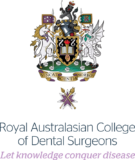Royal Australasian College of Dental Surgeons (RACDS)
Specialty Area
Oral and Maxillofacial Surgery
College Description
The Royal Australasian College of Dental Surgeons (RACDS) provides a broad range of activities to enhance the professional development of both general and specialist dentists through individually mediated studies, examinations and continued professional development. The RACDS delivers the only training program in Australia and New Zealand in Oral and Maxillofacial Surgery (OMS). The program is jointly accredited by the Australian Medical Council (AMC), the Medical Council of New Zealand (MCNZ), the Australian Dental Council (ADC) and the New Zealand Dental Council (DCNZ).
Fellowship Name
Fellowship in Oral and Maxillofacial Surgery – FRACDS(OMS)
Fellowship Description
FRACDS(OMS) is the admission to the to the specialty of Oral and Maxillofacial Surgery. It demonstrates to the health regulators and the public that individuals are highly competent in OMS, have the requisite knowledge, skills and professional attitudes for successful independent practice and have the necessary attitudes and attributes to strive for continual review and improvement of their practice.
Indigenous Entry Path
No
Contact Information
-
For Aboriginal, Torres Strait Islander & Māori Members
Indigenous Trainees College Contact
Australia:
-
General College Contact
Australia:
Phone
Overview
Oral maxillofacial surgeons specialise in the oral and maxillofacial regions of the head and neck. They diagnose and treat problem wisdom teeth, facial pain, and misaligned jaws. They also treat accident victims for facial injuries, carry out reconstructive and dental implant surgery, treat tumors, developmental craniofacial abnormalities of the jaws or facial regions. The program is a minimum of four (4) years of continuous training; additional time may be required in certain circumstances. Training time completed in an accredited post is credited in periods of six (6) or 12 months only. The six (6) month training rotations must be undertaken continuously in the same position.
Admissions
In order to apply for eligibility for OMS Training, the applicant will be required to have completed the following pre-requisites, or to have completed them prior to the commencement of surgical training:
- A Dental degree and full registration as a dentist in Australia or New Zealand
- A Medical degree and full registration as a medical practitioner in Australia or New Zealand
- A full year of surgery in general (SIG) must be completed prior to the commencement of OMS training. Surgical rotations during this year should be undertaken in related surgical disciplines for a minimum of nine months e.g. ENT surgery, orthopaedic surgery, neurosurgery, ophthalmology, general & trauma surgery, plastic surgery, ICU, Anaesthetics and Emergency Medicine. If undertaking a first-year general surgical resident position in Oral & Maxillofacial Surgery, three (3) months to a maximum of six (6) months duration will be considered
- Meet any residency or visa requirements enabling employment at any hospital within the jurisdiction(s) for which they are applying
- For applicants who are undertaking the final year of a dental degree, the successful completion of the degree will be required prior to the commencement of surgical training.
Pathways
Indigenous Entry Pathways Description
Not applicable
Key Dates
- February – Trainee Induction Day
- May/June – SST Examinations
- July – Selection Interviews
- August/September – Final Examination
Placement Requirements
Refer to section Part A, Section 2.1 of the Handbook for Accredited Education and Training in Oral and Maxillofacial Surgery
Assessment
Trainees are required to keep logbooks of clinical training, and six-monthly assessment reports are completed bi-annually (February and August). Trainees must maintain a Learning Portfolio including annual logbook summaries, assessment forms, Team Appraisal of Conduct (TAC) reports, certificates of any relevance courses completed, conferences attended and all presentations. The Surgical Sciences and Training (SST) Examination must be successfully completed prior to entering the program, or during the first year. A Final Examination is undertaken during the last training year and a pass in this examination is mandatory for completion of the training program. Trainees are required to meet mandatory research requirements for the award of Fellowship.
Enrolment & Fees
Trainees are required to keep logbooks of clinical training, and six-monthly assessment reports are completed bi-annually (February and August). Trainees must maintain a Learning Portfolio including annual logbook summaries, assessment forms, Team Appraisal of Conduct (TAC) reports, certificates of any relevance courses completed, conferences attended and all presentations. The Surgical Sciences and Training (SST) Examination must be successfully completed prior to entering the program, or during the first year. A Final Examination is undertaken during the last training year and a pass in this examination is mandatory for completion of the training program. Trainees are required to meet mandatory research requirements for the award of Fellowship.
Stay informed
Discover the LIME Network Newsletter
July 2024 – Issue 49
Joining our network has its privileges
Becoming a member of the LIME Network will mean that you can keep in touch with what we are doing and have access to our latest resources and publications. We will let you know about upcoming LIME Connection Conferences and you will also receive our Newsletters four times per year.






